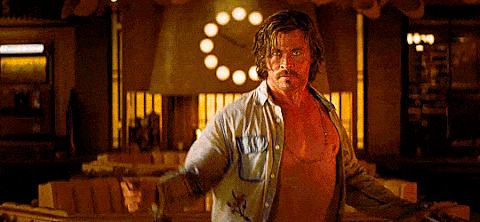7 strangers meet on a rain-soaked night at a kitschy hotel straddling the Nevada/California state line in 1969. Most of them are played by recognizable actors. The writer-director behind it all certainly knows his way around single-setting, ensemble cast mind-benders after making the meta-tastic horror-comedy The Cabin in the Woods six years ago. The trailer promised surprising twists, tortured backstories, a third act where all the storylines finally come together, possible genre deconstruction, and, oh yeah, this:
All of that should add up to a fun time at the movies, yet Bad Times at the El Royale squanders most of its inherent potential on a script which falls too in love with narrative tricks, direction which takes all of this far too seriously, and a run time which is at least 20 minutes too long.

After a mysterious prologue shows us Nick Offerman as a bank robber tearing up the floorboards of a hotel room to hide a bag of money, we jump 10 years ahead and start the story on Father Daniel Flynn (Jeff Bridges) and Darlene Sweet (Cynthia Erivo) as they meet for the first time outside the El Royale. They strike up a witty back-and-forth over the fact that, technically, she’s in California while he’s in Nevada.
Once inside, they meet Seymour Sullivan (Jon Hamm), a fast-talking, vaguely Southern-voiced vacuum salesman whose sales act is so polished, so always-on that it actually seems kind of suspicious. Plus, he lays down exposition so thick and fast you’re afraid you’ll step in it.
The El Royale, according to Seymour, used to be a hotspot for Reno, Lake Tahoe, and Hollywood bigwigs, but then it lost its gambling license. Forced to close its casino, the rest of the hotel has turned into a sad ghost town. Sinatra and the Rat Pack, we’re told, used to play there, but those days are long gone.

They are all eventually joined by Emily (Dakota Johnson), a standoffish badass who arrives in a muscle car, makes no eye contact with anyone, and signs the front desk ledger “FUCK YOU.” A squirrely concierge named Miles (a scene-stealing Lewis Pullman) finally arrives to check them in, but he looks as if he’s already deeply sorry for something terrible he’s done to all of them. What that could be, we don’t know. For their part, they all look at each other as if they’d rather keep their distance and be left alone.
Say, is it possible they’re all hiding some kind of secret? Also, I thought the poster said 7 strangers. I only count 4 so far.
That’s the hook of Bad Times: Who are these people? What are they actually up to? And who else might be joining them before the night is over? Spoiler: One of the late-arrivers has a name that rhymes with Hris Cemsworth.

Once the characters retreat to their rooms, El Royale slips into a series of character-specific chapters announced by title cards (“Room 1” is for Seymour, “Room 4” for Darlene, etc.). This is Tarantino-esque playfullness in theory, but it also means the story advances in increments before suddenly stopping to show backstory or another character’s version an event we’ve already seen. This differing-view-points trick mostly serves to hide the story’s deficiencies.

A pretzel-shaped mystery of suspect motivations and nefarious deeds unfolds. As the stories interlock, the script starts touching on some heavy themes and 60s era cultural touchstones – racism, abuse, Vietnam, scary hippie cults, government as Big Brother. But the more serious it gets the more the whole thing starts to feel like dramatic overreach.

Jeff Bridges, for example, is genuinely touching as – spoiler – an old criminal suffering from dementia, and Cynthia Erivo perfectly captures Darlene’s quiet rage over the racism she encounters, both in her job as a soul singer and in her general, day-to-day life. But why is all of that happening in this movie? Why is Drew Goddard so intent on making a serious drama out of something so pulpy?
Moreover, the interlocking story structure ends up frustrating more than it delights. Every time the story hits a “Holy shit!” moment – and there are several of them – the momentum is completely lost as we immediately cut to a this-is-how-this-person-got-to-that-point explainer. You think you’ve finally seen the last of them by the time a tense, climactic standoff arrives, yet when the tension is finally at its highest Goddard still sees the need for one last and-this-is-who-this-person-really-is cutaway.
It’s a perhaps fitting end for a film which never can seem to get out of its own way. That might be Goddard’s point entirely, to serve up 90s-style pulp before asking us to more seriously consider the morality of these assorted characters. If only he could have gotten to that point quicker.
THE BOTTOM LINE
Similar to Hotel Artemis earlier this year, Bad Times at the El Royale is a movie which takes a stacked cast, drops them into an unapologetically B-movie premise, and then proceeds to disappointingly fumble the execution, wasting so much talent in the process. Crucially, the inherent mystery of who these people really are and what’s actually happening at the hotel is not as rewarding as it should be. However, the quality production design, cinematography and surprisingly moving performances from Bridges and Erivo elevates this into a curiosity you probably won’t mind watching on HBO months from now.
RANDOM PARTING THOUGHT
An alt-recommendation would be James Mangold’s underrated 2003 thriller Identity, which works a similar premise through some overt Agatha Christie mimicry and a WTF finale.
UPDATE
I may have underestimated this movie or at least underestimated the raw power of Cynthia Erivo’s performance in it.



Perfectly decent and fun. Nice review.
Thanks. The film keeps improving in my mind with each passing day. I’d still say it’s a tad too long, but, as you said, it’s “perfectly decent and fun.”
Thanks for your review! I also think that it’s an extremely well-made movie, and I wrote about it here:
https://vengonofuoridallefottutepareti.wordpress.com/2018/11/27/bad-times-at-el-royale-extraordinary-english/